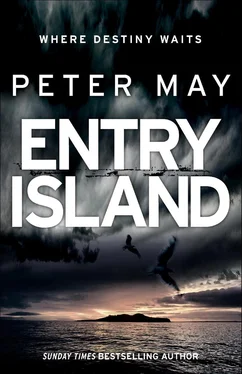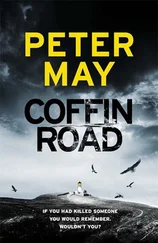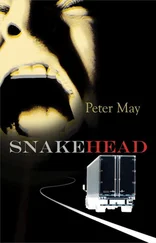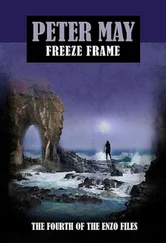Without any idea of what had happened he went straight to the hospital, where he was left sitting in a waiting room for almost two hours. No one told him anything, and he was almost beside himself with worry.
People came and went. Sick people. Worried relatives. Sime was just about to read the riot act to the nurse at reception when Marie-Ange came through the swing door. She was deathly pale, and clutching a small bag of belongings. She seemed oddly hunched, and when he hurried across the room to her she put her arms around him and buried her face in his chest. Sobs ripped themselves from her throat, and when she tipped her face back to look up at him he saw that it was shiny and wet with tears. She didn’t need to tell him that they had lost the baby.
Strangely, they had been closer in those next few days than they had in years. Sime pampered her, cooking, doing the washing, taking her breakfast in bed. They sat together at night on the settee with a glass of wine, watching mindless TV.
It was the following week that she had broken the news to him. Her gynaecologist had told her she would no longer be able to have children.
Sime had been devastated. Taking it almost harder than the loss of the baby. He had been revisited by the same sense of bereavement experienced after the death of his parents. Of regret. Of being all alone in the world. Not just then, but for ever. And of somehow failing, not just his parents, but their parents, and their parents before them. It would all end with him. So what point had there been to any of it?
Sime stood smarting in the doorway. She had always claimed that learning she couldn’t give him a child had changed him. Changed them. That it had been the beginning of the end. His fault, not hers.
And now the revelation that the baby had not even been his.
But for some reason, something didn’t quite ring true. Discovering Marie-Ange and Crozes in bed the night before. Realising that they’d been lovers for months, maybe years. And now replaying that awful time when she had lost the child. All of it brought a sudden reinterpretation of events. As if scales had fallen from his eyes. He felt a surge of anger and disbelief, and started off round the building at a run.
She was sitting behind the wheel of the second rental car, engine idling, but making no attempt to drive away. He ran across the car park and pulled the driver’s door open. She looked up at him, her face wet with tears, just as it had been that day at the hospital.
‘You liar,’ he said.
She flinched as if he had struck her.
‘That was my kid. But you figured if you had it you were going to be stuck with me, right?’ And when she didn’t respond. ‘Right?’
There was a singular vacancy in her eyes.
‘You didn’t go to your parents at all that week. You had an abortion, didn’t you? From some back-street quack. ’Cos you couldn’t do it legitimately without me knowing.’ He stared at her in disbelief. ‘You killed my child.’
She said nothing for a very long time, then in barely a whisper she said, ‘Our child.’ She pulled the door shut, engaged Drive, and accelerated away across the tarmac.
Long after she had gone, Sime stood by the sentier littoral staring out across the Baie de Plaisance towards the now familiar contour of Entry Island lying along the horizon. Children were playing on the beach, barefoot, running in and out of the incoming waves, screaming as cold water broke over little legs. The breeze ruffled his hair and filled his jacket. He felt hollowed out. His emptiness gnawed at him like a hunger. He was numbed by fatigue.
The longer he stared at this island which had grown to dominate his life these last days, the more compelled he felt to return to it. He had no idea why, except for a powerful sense that whatever answers it was he was seeking were to be found there.
He returned to the car park and got into the Chevy, driving up to the Chemin Principal and then north past the hospital and Tim Horton’s to the harbour. There he found the boatman whose fishing boat had been requisitioned by the Sûreté. He was sitting in the back of his vessel at the quayside smoking a small cigar and untangling fishing nets. He looked up, surprised, when Sime climbed down into the boat. ‘I need you to take me over to Entry,’ Sime said.
‘Lieutenant Crozes said I wouldn’t be needed till later.’
‘Change of plans. I need to go over now.’
When they arrived at Entry Island, Sime told him he could take the boat back to Cap aux Meules. He would make the return trip on the ferry. He stood watching as the fishing boat chugged out of the shelter of the breakwater and back into choppier waters in the bay, then turned to walk past the minibus where they had left it parked up for use on the island. He could have taken it. But he wanted to be on foot, to feel the island beneath his feet. He passed fishing boats with mundane names like Wendy Cora and Lady Bell , and turned on to the wide, unsurfaced Main Street that swept along the east coast of the island. Sunlight washed across the bay from the distant Cap in moments of broken sky. To the south-west, and much closer, was the Sandy Hook, a long curve of sandbank that extended from La Grave at the eastern point of the island of Havre Aubert. It reached out like a bony finger towards Entry Island.
The breeze was freshening a little, but it was still warm. He headed south past Josey’s restaurant. On his left, a chain was strung across the track that climbed to the little airstrip which had once played host to a winter passenger schedule between Entry Island and Havre aux Maisons. The short stretch of runway where Cowell had habitually landed his single-engined aircraft and picked up his Range Rover. The plane was still there, sitting on the tarmac.
At the top of the slope the road cut inland and he followed it up to the Anglican church. A plain white building of clapboard siding with green trim around small arched windows. It stood on the hill with a panoramic view extending west. A huge white cross, held in place against powerful winds by steel cables, cast its shadow across the graveyard.
Sime opened the gate and walked past a ship’s bell on a rusted metal mounting to wander among the headstones in the late-afternoon sunshine. Rifleman Arthur E. McLean; Curtis Quinn; Dickson, infant son of Leonard and Joyce. Some of them dated back decades. Others were more recent. But those who had staked their claim to a place here on the slopes of Entry Island were unlikely to be joined by too many more of their fellow islanders as the population dwindled towards extinction.
Sime’s shadow fell across an old, weather-worn headstone that stood no more than eighteen inches high and leaned at a slight angle in the grass. He was barely able to make out the name McKay, and he crouched down to brush away more than a century’s accumulation of algae and lichen. Kirsty McKay, he read. Daughter of Alasdair and Margaret. Died August 5th, 1912, aged 82 . Kirsty’s great-great-great-grandmother. It had to be. The old lady whose photograph he had seen in the album started by Kirsty’s mother. He tried to recall her face, but the detail was gone. There was just an impression left in his mind of a time when people of a certain generation all seemed to look the same. Perhaps the homogenising effect of a popular hairstyle, or a fashion in clothes and hats. Or the limitations of those early cameras. The black, white and sepia prints, the poor lighting. Too dark or too light, too much contrast or too little.
Whatever it was, Sime found something sad in stumbling across the old lady’s grave like this. An image in a photo album perpetuates the illusion of life. Long after death, a smile or a frown lingers on. But a hole in the ground, with a stone marking the place where your head has been laid, is for eternity. He placed his hand on the stone. It was cool against his skin, and he felt the strangest sense of affinity with the old woman whose bones lay beneath him. As if somehow she made a bridge between his past and his present. Between him and her great-great-great-granddaughter.
Читать дальше












